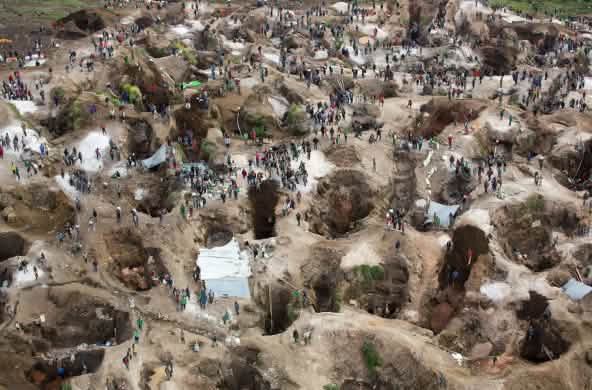Completed campaign
Save the Noah's Ark of the South Pacific!
The phosphor mine has not been realized as of early 2025. We are therefore closing this petition.
Makatea Atoll in French Polynesia is a veritable treasure trove of nature in the middle of the South Pacific. That may soon be history, however – an Australian company wants to mine the tiny island for phosphate to produce synthetic fertilizer. Please stand with the Makatea islanders against this looming ecological disaster.
To: French Minister of Ecology François de Rugy and the President of French Polynesia, Édouard Fritch
“Do not sacrifice Makatea Atoll to phosphate mining for fertilizer.”Millions of years ago, tectonic forces lifted a coral reef out of the South Pacific to create Makatea Atoll. High cliffs of white limestone surround the island of 28 square kilometers. It is home to pristine ecosystems with unique vegetation. Makatea is the last remaining habitat of endangered species such as the Polynesian imperial pigeon.
French filmmaker Michel Huet (see short and full-length videos) calls it the Noah’s Ark of French Polynesia. While most Polynesian atolls may soon disappear due to climate change, Makatea rises more than 100 meters above the Pacific, protecting the island and its ecosystems from the ravages of rising sea levels.
Makatea is now in grave danger: Australian investors want to mine phosphate on the island. Phosphate is used to manufacture synthetic fertilizers used in industrial agriculture – and it’s a billion-dollar business. The investors are stepping up the pressure, hoping to get started as early as 2017. The government in Papeete on Tahiti, the capital of French Polynesia, is deciding on the mining concession – without having done any fact-finding on the ground, however.
The inhabitants of Makatea live modestly from the resources the island offers. They have no doubt that their future does not lie in its exploitation by industry. Local organizations are supporting them in resisting the impending destruction. Together, they are calling on the governments of France and French Polynesia to reject the application for a mining concession by SAS Avenir Makatea Pty Ltd, a company based in Newcastle, Australia.
Please support the islanders' petition with your signature!
French filmmaker Michel Huet has made a 25-minute documentary about Makatea Atoll. Here is his film Le trésor de Makatea (The Treasure of Makatea) in a short (4 minutes) and full-length version.
Makatea is a raised coral atoll, a reef that was pushed up above sea level by tectonic forces. The island is located in the Tuamotu Archipelago, a South Pacific island group belonging to French Polynesia. A total of 78 islands of various sizes belong to this largest group of coral atolls. Makatea, however, is the only raised atoll of the group. With the exception of the Gambier Islands, the rest are flat and only rise a few meters above sea level.
The phosphate consists of deposits of marine plankton and the excretions of millions of seabirds from over the millennia. Phosphate had already been mined for the fertilizer industry in the past, from 1911 to 1966.
According to IUCN Red List, the Polynesian imperial pigeon (Ducula aurorae) occurs only on Makatea, with an estimated population of 1,200 birds remaining. It is classified as endangered. Past populations of the species on Tahiti are listed as extinct. The birds live in dense forests and feed on the fruits of forest plants. According to the Red List, the greatest threats to the species are the planned resumption of phosphate mining on the island and related projects such as the construction of a runway for aircraft.
Further information (in French):
To: French Minister of Ecology François de Rugy and the President of French Polynesia, Édouard Fritch
Mr. President, Minister de Rugy,
We call on you to protect the immediate and long-term future of Makatea Atoll in Tuamotu Archipelago.
Makatea is a precious part of our planet’s natural heritage. The atoll, which was lifted out of the ocean by tectonic forces millions of years ago, has survived cyclones and rising sea levels during the hot periods of planet’s history.
Makatea secures the existence of flora and fauna that are largely absent in the Tuamotu Archipelago and in large parts of the Pacific. In other words, it is an ecological Noah’s Ark of French Polynesia.
The inhabitants of the atoll benefit from an old-growth forest inhabited by endemic plants and animals that provides them with food and fresh water. They also farm on a completely organic basis and keep bees. All of this is unique in the Tuamotu Archipelago.
Today, however, Makatea is in great danger: SAS Avenir Makatea, an Australian mining company, plans to exploit the island’s natural resources. Its current goal is to explore the old mining area, taking cores down to 30 meters below the natural land surface.
Having established this beachhead, the company would then begin mining on the uninhabited part of the atoll, where treasure in the form of phosphate lies buried. In its application for a mining concession, the company portrayed Makatea as a lifeless, sun-baked rock in the ocean. That is demonstrably false.
France has the most far-flung territories of any country on Earth. It has the responsibility to preserve and foster the natural and cultural heritage of its overseas territories.
The inhabitants of Makatea want to develop their own sources of income, for example through agriculture and ecotourism. They know that they have no future if their island is destroyed. Together with the organizations Fatu Fenua no Makatea and Rupe no Makatea, we call on the authorities of Polynesia and France to reject SAS Avenir Makatea’s application for a mining concession.
Respectfully yours,

